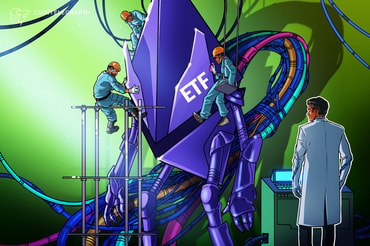Bitcoin Price Shrugs Off Latest $2B Mt. Gox Transfer as Distribution Nears Its End

Bitcoin’s (BTC) price barely budged after Mt. Gox, the defunct Japanese exchange, unloaded another $2 billion of tokens late Tuesday, inching closer to finishing its $9 billion asset distribution that has been a major source of worry for investors.
Blockchain data by Arkham intelligence shows that Mt. Gox-related addresses moved 47,229 BTC worth roughly $3.1 billion between internal wallets and then transferred nearly 34,000 BTC worth $2.3 billion to new addresses little before Tuesday at midnight UTC. Arkham analysts said that the recipient was most likely BitGo, the last one of the five crypto service providers where creditors will be able to reclaim their funds.
After today’s movements, Mt. Gox wallets held $3 billion BTC, down from $9 billion last month, according to Arkham data.
Previous instances of large Mt. Gox transfers triggered price declines, but today’s flattish price action signals that traders have perhaps moved past the fears of sell pressure. Bitcoin dropped 0.4% from $66,000 immediately following the transaction during the Asian trading session, but later rebounded to around $66,500 by U.S. hours.
The distribution of a total $9 billion worth of bitcoin – and a smaller amount of bitcoin cash (BCH) – from Mt. Gox, once the largest bitcoin exchange before it imploded in 2014 due to a hack, has been weighing on the crypto market sentiment with investors concerned about creditors selling assets realizing the profits of 10 years of price appreciation. The trust managing the Mt. Gox assets started distributing assets in July sending tokens to exchanges including Kraken and Bitstamp to creditors who opted to receive their claim in digital assets instead of fiat money.
“From a psychological perspective, this represents the final chapter in a major market overhang over the industry,” a Glassnode report said this week.
Glassnode analysts examined the cumulative volume delta (CVD) on Kraken and Bitstamp, and saw only a minor uptick in BTC selling following the days creditors received tokens on the platforms. CVD measures the net difference between spot buying and selling volumes on centralized exchanges.
“This adds a bit more evidence to our thesis that creditors may be better thought of as having the mindset of long-term holders for the time being,” the report added.
Edited by Stephen Alpher.
Disclosure
Please note that our privacy policy, terms of use, cookies, and do not sell my personal information has been updated.CoinDesk is an award-winning media outlet that covers the cryptocurrency industry. Its journalists abide by a strict set of editorial policies. In November 2023, CoinDesk was acquired by the Bullish group, owner of Bullish, a regulated, digital assets exchange. The Bullish group is majority-owned by Block.one; both companies have interests in a variety of blockchain and digital asset businesses and significant holdings of digital assets, including bitcoin. CoinDesk operates as an independent subsidiary with an editorial committee to protect journalistic independence. CoinDesk employees, including journalists, may receive options in the Bullish group as part of their compensation.
Krisztian Sandor is a reporter on the U.S. markets team focusing on stablecoins and institutional investment. He holds BTC and ETH.

Published on Other News Site












